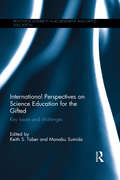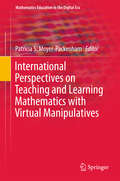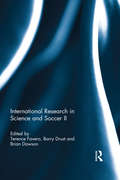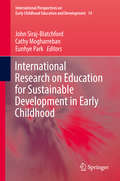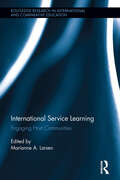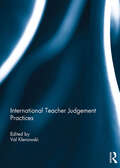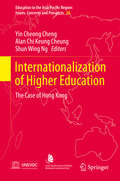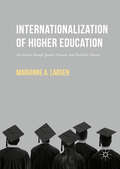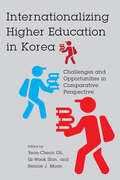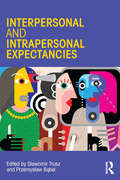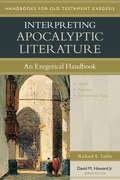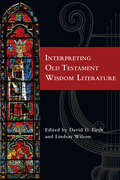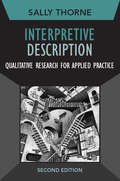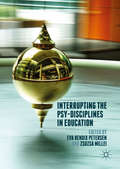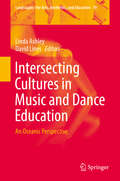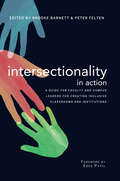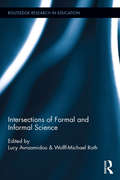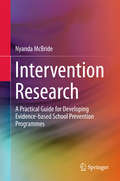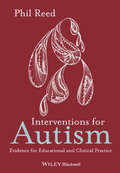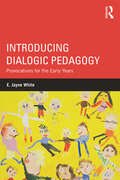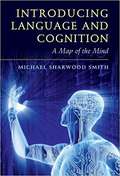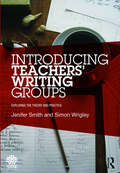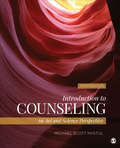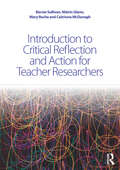- Table View
- List View
International Perspectives on Science Education for the Gifted: Key issues and challenges (Routledge Research in Achievement and Gifted Education)
by Manabu Sumida Keith S TaberIn the spirit of encouraging international dialogue between researchers and practitioners, often working within isolated traditions, this book discusses perspectives on science education for the gifted informed by up-to-date research findings from a number of related fields. The book reviews philosophy, culture and programmes in science education for the gifted in diverse national contexts, and includes scholarly reviews of significant perspectives and up-to-date research methods and findings. The book is written in a straightforward style for students studying international perspective modules on undergraduate, but especially masters and doctoral degrees in Science Education and Gifted Education. Gifted education has come to be regarded as a key national programme in many countries, and gifted education in science disciplines is now of major importance to economic and technological development. Despite these national initiatives and developments, there are very few discussions on gifted education in science from international perspectives. This will be a valued addition to the scholarship in this emergent field.
International Perspectives on Teaching and Learning Mathematics with Virtual Manipulatives
by Patricia S. Moyer-PackenhamThis book explores terminology, frameworks, and research being conducted worldwide on virtual manipulatives. It brings together international authors who provide their perspectives on virtual manipulatives in research and teaching. By defining terminology, explaining conceptual and theoretical frameworks, and reporting research, the authors provide a comprehensive foundation on the study and use of virtual manipulatives for mathematics teaching and learning. This foundation provides a common way for researchers to communicate about virtual manipulatives and build on the major works that have been conducted on this topic. By discussing these big ideas, the book advances knowledge for future research on virtual manipulatives as these dynamic tools move from computer platforms to hand-held, touch-screen, and augmented platforms.
International Research in Science and Soccer II
by Brian Dawson Terence Favero Barry DrustInternational Research in Science and Soccer II showcases the very latest research into the world’s most widely played sport. With contributions from scientists, researchers and practitioners working at every level of the game, from grassroots to elite level, the book covers every key aspect of preparation and performance, including: • performance and match analysis; • training and testing; • physiotherapy and injury prevention; • biomechanics; • youth development; • women’s soccer; • sport science and coaching; • sport psychology. Sports scientists, trainers, coaches, physiotherapists, medical doctors, psychologists, educational officers and professionals working in soccer will find this in-depth, comprehensive volume an essential and up-to-date resource. The chapters contained within this volume were first presented at The Fourth World Conference on Science and Soccer, held in Portland, Oregon, in June 2014 under the auspices of the World Commission of Science and Sports.
International Research on Education for Sustainable Development in Early Childhood
by John Siraj-Blatchford Cathy Mogharreban Eunhye ParkThis book offers a perspective on Education for Sustainable Development in Early Childhood (ESDEC) that is far removed from the 'business as usual' notion of an extended, predominantly environmental, educational curriculum for preschools. It presents a vision of sustainable development that has relevance to Early Childhood Care and Education (ECCE) from birth to school; it is relevant as much to homes, family support and health settings as it is to educational settings, and is as much concerned with health and wellbeing as with education. The book provides a perspective that is fundamentally embedded in notions of interdependency. It places an emphasis upon the importance of recognising the interdependency of peoples within and between nation states; the ecological interdependencies of the natural world; of humanity and nature; and most significantly the interdependency of adults and children. These emphases have their origins in the grassroots studies included in the ten chapters representing countries from around the world. The book reflects the idea that only global solutions and initiatives are capable of addressing the global challenges of climate change, environmental pollution, and global threats to ecological systems and biodiversity.
International Service Learning: Engaging Host Communities (Routledge Research in International and Comparative Education)
by Marianne A. LarsenInternational service learning (ISL) programs are growing more popular with students looking to advance their skills and knowledge to become global citizens. While the benefits of these programs among students are well documented, little is known about the implications they have on host communities themselves. This volume explores the impact of ISL programs on members of host communities (e.g. host families and local partner NGOs) who are increasingly influenced by the presence of international students in their lives. Drawing upon post-colonial, feminist and other critical and decolonizing theories, it examines the complicated power relations between North American ISL students and host communities in East and West Africa, the Caribbean and Central America. It stresses the importance of developing trusting relations between ISL students, faculty and individuals in the host communities to create mutually engaging learning experiences.
International Teacher Judgement Practices
by Val KlenowskiHuman judgements underlie all assessments regarding the quality of students’ understandings, and such judgements are conceptually complex and elusive. The study of the complexity of the judgement process is in its infancy but clearly warrants further critical investigation. However, what is demonstrated from the wide variety of international teacher judgement practices presented in this volume is that teacher judgement requires a lot more than a set of standards, criteria and annotated examples. Understandings of assessment theory by pre-service teachers through to more experienced teachers, and opportunities for all to critically reflect and consider their judgements of student work, are vital. Teachers are struggling to maintain their interpretive freedom at the local, professional level in contexts where central policies promote standardisation or ‘regulation’ of judgement practice, for accountability purposes. This book was originally published as a special issue of Assessment in Education: principles, policy & practice.
Internationalization of Higher Education
by Yin Cheong Cheng Alan Chi Keung Cheung Shun Wing NgThis book reviews and analyses the issues and policies of internationalization and exportation of higher education and investigates the strategies and models of education hub development in the context of globalization, with Hong Kong in the Asia-Pacific region as a case study. It examines the close relationship between education hubs and higher education, as well as the strategic functions of an education hub in the future development of a society in a competitive global environment. It also analyses the major strengths, weaknesses, opportunities, and threats of Hong Kong's higher education in relation to its potential for exporting higher education to Asian markets. In particular, it reviews the current state of higher education services offered by Hong Kong in three target markets and their segmentation and proposes the most appropriate market entry strategies for education service providers.
Internationalization of Higher Education: An Analysis through Spatial, Network, and Mobilities Theories
by Marianne A. LarsenThis book provides a cutting-edge analysis of the ways in which higher education institutions have become more international over the past two decades. Drawing upon a range of post-foundational spatial, network, and mobilities theories, the book shifts our thinking away from linear, binary, Western accounts of internationalization to understand the complex, multi-centered and contradictory ways in which internationalization processes have played out across a wide variety of higher education landscapes worldwide. The author explores transnational student, scholar, knowledge, program and provider mobilities; the production of mobile bodies, knowledges, and identities; the significance of place in internationalization; and the crucial role that global university rankings play in reshaping the spatial landscape of higher education.
Internationalizing Higher Education in Korea: Challenges and Opportunities in Comparative Perspective
by Yeon-Cheon Oh, Gi-Wook Shin, and Rennie J. MoonStudent mobility in Asia has reached unprecedented levels. Inbound and outbound student mobility creates opportunities for Asian societies but also challenges, such as growing diversity and brain drain. This book examines these and other related, timely issues for the case of South Korea, a major player in the internationalization of higher education in Asia, and draws on the comparative experiences of other key players in the Asia-Pacific region—Japan, China, Singapore, and the United States. By doing so, it offers critical perspectives on the internationalization of Korean higher education as well as innovative, policy-relevant solutions for Asian countries undergoing similar challenges. It will be a valuable addition to the growing literature on comparative and international education in Asia and can aid university administrators and policymakers striving to internationalize their higher education systems to meet new challenges.
Interpersonal and Intrapersonal Expectancies
by Sławomir Trusz Przemysław BąbelDo our expectancies about ourselves and about others have any effect on our actual experiences? Over fifty years of research studies suggest not only that this is the case, but also that our expectancies can shape other people’s experience in different contexts. In some cases they can help, but other times they can do harm instead. Interpersonal and Intrapersonal Expectancies provides a theory, a research review, and a summary of the current knowledge on intra- and interpersonal expectancy effects and related phenomena. Based on extensive study, and written by eminent experts from some of the world’s leading academic institutions, the book presents the most recent knowledge on social and psychological mechanisms of forming both intra- and interpersonal expectancies. It also considers how expectancies are sustained and what their consequences are, as well as discussing the latest theoretical concepts and the most up-to-date research on expectancy effects. This book represents the first review of the phenomenon of interpersonal expectancies in over 20 years, and the only publication presenting a complementary view of both intra- and interpersonal expectancies. It aims to open up a discussion between researchers and theoreticians from both perspectives, and to promote an integrative approach that incorporates both.
Interpreting Apocalyptic Literature: An Exegetical Handbook (Handbooks for Old Testament Exegesis)
by Richard A. TaylorAn appreciation for the rich diversity of literary genres in Scripture is one of the positive features of evangelical scholarship in recent decades.—-David M. Howard Jr., series editorAt one time, Old Testament apocalyptic literature was relegated to the more obscure reaches of biblical scholarship, acceptable to occasionally refer to, but too thorny to delve into deeply. However, in recent decades it has moved to the forefront of research. The rich veins of insight to be mined in the book of Daniel and other apocalyptic texts are being rediscovered. Richard A. Taylor has crafted a handbook to explore those riches and uncover a way to understand apocalyptic literature more fully.Taylor begins with a helpful introduction to the genre; surveys the purpose, message, and primary themes of Old Testament apocalyptic literature; and then discusses critical questions and key works for further study. He also provides guidelines for interpreting apocalyptic texts, followed by Old Testament passages that serve to illustrate those guidelines.While primarily written for pastors and graduate students, Interpreting Apocalyptic Literature is nonetheless accessible to those who simply want to study the texts more deeply than previously possible.
Interpreting Old Testament Wisdom Literature: Literature And Themes
by David G. Firth Lindsay WilsonChristopher B. AnsberryCraig G. BartholomewLennart BoströmRos ClarkeKatharine J. DellDavid G. FirthGregory GoswellErnest C. LucasBrittany N. MeltonSimon StocksLindsay Wilson
Interpretive Description: Qualitative Research for Applied Practice (Developing Qualitative Inquiry)
by Sally ThorneThe first edition of Interpretive Description established itself as the key resource for novice and intermediate level researchers in applied settings for conducting a qualitative research project with practical outcomes. In the second edition, leading qualitative researcher Sally Thorne retains the clear, straightforward guidance for researchers and students in health, social service, mental health, and related fields. This new edition includes additional material on knowledge synthesis and integration, evidence-based practice, and data analysis. In addition, this book takes the reader through the qualitative research process, from research design through fieldwork, analysis, interpretation, and application of the results; provides numerous examples from a variety of applied fields to show research in action; uses an accessible style and affordable price to be the ideal book for teaching qualitative research in clinical and applied disciplines.
Interrupting the Psy-Disciplines in Education
by Zsuzsa Millei Eva Bendix PetersenThis book offers critical explorations of how the psy-disciplines, Michel Foucault's collective term for psychiatry, psychology and psycho-analysis, play out in contemporary educational spaces. With a strong focus on Foucault's theories, it critically investigates how the psy-disciplines continue to influence education, both regulating and shaping behaviour and morality. The book provides insight into different educational contexts and concerns across a child's educational lifespan; early childhood education, inclusive education, special education, educational leadership, social media, university, and beyond to enable reflection and critique of the implications of psy-based knowledge and practice. With chapters by a mixture of established and emerging international scholars in the field this is an interdisciplinary and authoritative study into the role of the psy-disciplines in the education system. Providing vivid illustrations from throughout the educational lifespan the book serves as an invaluable tool for reflection and critique of the implications of psy-based practice, and will be of particular interest to academics and scholars in the field of education policy and psychology.
Intersecting Cultures in Music and Dance Education
by David Lines Linda AshleyThis volume looks forward and re-examines present day education and pedagogical practices in music and dance in the diverse cultural environments found in Oceania. The book also identifies a key issue of how teachers face the prospect of taking a reflexive view of their own cultural legacy in music and dance education as they work from and alongside different cultural worldviews. This key issue, amongst other debates that arise, positions Intersecting Cultures as an innovative text that fills a gap in the current market with highly appropriate and fresh ideas from primary sources. The book offers commentaries that underpin and inform current pedagogy and bigger picture policy for the performing arts in education in Oceania, and in parallel ways in other countries.
Intersectionality in Action: A Guide for Faculty and Campus Leaders for Creating Inclusive Classrooms and Institutions
by Peter Felten Brooke BarnettColleges and universities silo diversity and inclusion by creating specific courses to address them, or programs to welcome and support people with a range of identities, whereas in reality students, faculty and staff do not encounter diversity in the fractured ways that match the organizational structures of our institutions. We all simultaneously embody a variety of identities with different saliency in different circumstances and times.This book offers models for institutions to move intentionally toward intersections – of study abroad and multiculturalism, of race and gender and religion, and of other essential aspects of our educational programs and our students’ identities – to open doors to new possibilities that better prepare our students for life in a diverse world, and that allow our institutions to become more efficient and effective as we strive to not simply do things better in our own separate spheres, but to do better things by working together across difference.Each chapter offers action-oriented analysis focusing on particular campus intersections, rather than attending to specific demographic groups. Chapter authors also build on their own local expertise of doing this work on campuses that often do not have deep pockets or rich histories of such efforts.The book is organized into three sections:* People focuses on diversity broadly defined, considering questions about how we recruit and engage the students, faculty, and staff in the campus community, and how we work with governing boards and others to promote inclusive excellence.* Environment focuses on inclusion, including residence life, the local community, the working and learning environment, and external factors and events such as national and international news or town gown relationships.* Learning focuses on perspective taking and learning about difference in the core curriculum, the disciplines, and the co-curriculum, as well as professional development for faculty and staff.This ground reaking book helps readers, no matter what position they occupy on campus, to develop the knowledge and capacities necessary to create inclusive classrooms and is premised on the understanding that identity, oppression, power and marginalization cannot be addressed by looking solely at single identities.
Intersections of Formal and Informal Science (Routledge Research in Education #165)
by Wolff-Michael Roth Lucy AvraamidouScience learning that takes place between and at the intersections of formal and informal science environments has not been systematically reviewed to offer a comprehensive understanding of the existing knowledge base. Bringing together theory and research, this volume describes the various ways in which learning science in various settings has been conceptualized as well as empirical evidence to illustrate how science learning in these settings can be supported.
Intervention Research
by Nyanda McbrideThis book offers a step-by-step guide to intervention research, including the methods and techniques that researchers, higher degree research students and others can use when pursuing intervention research in schools and other settings. Guided by the Intervention Research Framework, it also provides practical information on linking a program developed using a comprehensive, evidence-based approach, to research and evaluation processes. The handbook also illustrates how to select an appropriate research sample for research; how to develop valid and reliable instruments for measuring change, including how to devise appropriate measures for assessing behavioural change; how to recruit and negotiate with schools (and other settings) for research involving young people; how to measure and incorporate measures of fidelity of implementation to understand dose response and behavior change; and how to optimize data collection and dissemination. The development and longitudinal assessment of the multi award-winning School Health and Alcohol Harm Reduction Project (SHAHRP) - the first alcohol harm reduction study to assess the impact of a school-based classroom intervention on alcohol use, alcohol-related behaviors and alcohol-related harm using a harm reduction paradigm - provides a practical example of the intervention research processes described in this handbook.
Interventions for Autism
by Phil ReedProviding a vital link between theory and practice, this unique volume translates the latest research data on the effectiveness of interventions for Autism Spectrum Disorder (ASD) into practical guidance for education professionals working with ASD pupils. Reformulates new research data on interventions for ASD into guidance for professionals, drawing on the author's in-depth academic knowledge and practical experience Offers a comprehensive review of up-to-date evidence on effectiveness across a wide range of interventions for ASD Focuses on environmental factors in understanding ASD rather than outdated 'deficit' approaches, and discusses key issues in education provision such as inclusion
Introducing Dialogic Pedagogy: Provocations for the Early Years
by E. Jayne WhiteIntroducing Dialogic Pedagogy presents some of the ideas of Russian philosopher Mikhail Bakhtin concerning dialogism in a way that will engage and inspire those studying early childhood education. By translating the growing body of dialogic scholarship into a practical application of teaching and learning with very young children, this book provides readers with alternative ways of examining, engaging and reflecting on practice in the early years to provoke new ways of understanding and enacting pedagogy. This text combines important theoretical ideas with a practical application to support practitioners who are keen to promote creativity and agency through ethical self-other relations. It provides unique insights into the amazing world of the youngest child, and offers enriched understandings of the profound impact of adults in their journey of becoming (or bildung). Key points covered include: Investigating dialogic philosophy and its application to early childhood education, with an emphasis on notions of justice, democracy, ethics and answerability Considering the relationship between dialogism and pedagogical approaches Theorising a range of approaches to relevant early childhood practice, as pedagogy This accessible and readable guide offers sound theoretical principles with practical suggestions for early years’ settings. The book is supplemented by an extensive online video resource website that will bring these revolutionary ideas to life. .
Introducing Language and Cognition
by Smith Michael SharwoodIn this accessible introduction, Mike Sharwood Smith provides a working model or 'map' of the mind, with language as its centrepiece. Drawing on cutting-edge research across linguistics, psychology and neuroscience, it allows students to quickly grasp how each separate aspect of the mind's operations can be related. This 'big picture' view includes the way the mind makes, stores and loses memories of all kinds as well how its various 'expert systems' combine and collaborate to solve, typically beyond our conscious awareness, the myriad of tasks we are faced with every minute and millisecond of our existence. The book also focuses on language, that is, the mind of monolingual, bilingual and multilingual speakers. It will be of interest to all students wishing to learn more about the complex relationship between language - one of the most important ways in which we define ourselves as human - and the mind.
Introducing Teachers’ Writing Groups: Exploring the theory and practice (National Association for the Teaching of English (NATE))
by Jenifer Smith Simon WrigleyTeachers’ writing groups have a significantly positive impact on pupils and their writing. This timely text explains the importance of teachers’ writing groups and how they have evolved. It outlines clearly and accessibly how teachers can set up their own highly effective writing groups. In this practical and informative book, the authors: share the thinking and practice that is embodied by teachers’ writing groups provide practical support for teachers running a group or wishing to write for themselves in order to inform their practice cover major themes such as: the relationship between writing teachers and the teaching of writing; writing as process and pleasure; writing and reflective practice; writing journals and the writing workshop. The authors provide a rationale for the development of writing groups for teachers and for ways of approaching writing that support adult and child writers and this rationale informs the ideas for writing throughout the book. All writing and teaching suggestions have been extensively tried and tested by class teachers, and will be of enormous interest to any teacher or student teacher wishing to run their own successful writing group.
Introduction to Counseling: An Art and Science Perspective
by Michael S. NystulIntroduction to Counseling provides an overview of counseling and the helping professions from the perspective of art and science—the science of counseling that generates a knowledge base proven to promote competency and efficacy in the practitioner, and the art of using this knowledge base to build skills that can be applied sensitively to clients in a multicultural society. The Fifth Edition has been organized into three sections: (1) an overview of counseling and the counseling process, (2) multicultural counseling and counseling theories, and (3) special approaches and settings. It continues to address key topics and issues, including gender, culture, and sexual orientation, and offers ways to integrate multiculturalism into all aspects of counseling, rather than view it as a separate entity. Highlighting emerging trends and changes in ethical codes, as well as reflecting the latest updates to the Diagnostic Statistical Manual (DSM-5), the book successfully illustrates the importance of art and science to modern-day counseling.
Introduction to Counseling: An Art and Science Perspective
by Michael S. NystulIntroduction to Counseling provides an overview of counseling and the helping professions from the perspective of art and science—the science of counseling that generates a knowledge base proven to promote competency and efficacy in the practitioner, and the art of using this knowledge base to build skills that can be applied sensitively to clients in a multicultural society. The Fifth Edition has been organized into three sections: (1) an overview of counseling and the counseling process, (2) multicultural counseling and counseling theories, and (3) special approaches and settings. It continues to address key topics and issues, including gender, culture, and sexual orientation, and offers ways to integrate multiculturalism into all aspects of counseling, rather than view it as a separate entity. Highlighting emerging trends and changes in ethical codes, as well as reflecting the latest updates to the Diagnostic Statistical Manual (DSM-5), the book successfully illustrates the importance of art and science to modern-day counseling.
Introduction to Critical Reflection and Action for Teacher Researchers: A Step-by-step Guide
by Caitriona McDonagh Mary Roche Bernie Sullivan Máirín GlennIntroduction to Critical Reflection and Action for Teacher Researchers provides crucial direction for educators looking to improve their teaching and maximise learning. While many students can grasp the basic elements of researching their practice and can write about practitioner research, some need guidance and assistance to reflect meaningfully on their teaching practice so as to articulate their educational values. This book provides this guidance. By exploring how to engage in an authentic, practical and personalised framework, the book encourages critical reflection and action on educational practice. Moving through the process of reflecting on practice, engaging in critical thinking and planning and taking action, it helps the reader to subsequently generate educational theory from their own personal learning. Examples from the authors’ experiences illustrate the issues raised in each section, with ‘Pause and Reflect’ activities, guidelines for conducting a research project and annotated further reading available for every chapter. Introduction to Critical Reflection and Action for Teacher Researchers is based on the idea that reflection is in itself a deliberate action and something we must live - it is key to understanding our practice and is a core component of action research. This book is a valuable guide for teachers, trainee teachers and researchers interested in reflecting on and enhancing their teaching practice.
